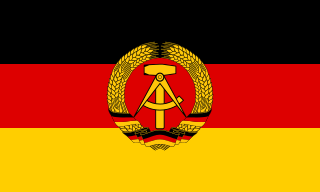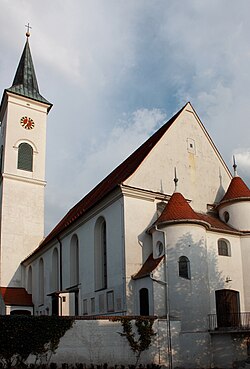Merzig-Wadern is a Kreis (district) in the northwest of the Saarland, Germany. Neighboring districts are Trier-Saarburg, Sankt Wendel, Saarlouis, the French département Moselle, and Luxembourg.
Saarlouis is a Kreis (district) in the middle of the Saarland, Germany. Neighboring districts are Merzig-Wadern, Sankt Wendel, Neunkirchen, Saarbrücken, and the French département Moselle.

Dschinghis Khan is a German pop band. It was originally formed in Munich in 1979 to compete in the Eurovision Song Contest with their song "Dschinghis Khan". In 2018, there have been two groups with the name: the one led by original members Henriette Strobel and Edina Pop, and a more current group led by original member Wolfgang Heichel and Stefan Track, who replaced the late Louis Potgieter in the 2005 reunion concert.

Lebach is a town in the district of Saarlouis, in Saarland, Germany. It is situated approximately 15 km northeast of Saarlouis, and 20 km north of Saarbrücken. As of 2012, its population was 19,456.

Wolfgang Paul was a German physicist, who co-developed the non-magnetic quadrupole mass filter which laid the foundation for what is now called an ion trap. He shared one-half of the Nobel Prize in Physics in 1989 for this work with Hans Georg Dehmelt; the other half of the Prize in that year was awarded to Norman Foster Ramsey, Jr.

Wolfgang Overath is a former West German footballer. A true one-club man, Overath spent his entire professional career at 1. FC Köln. He represented his country three times in World Cup finals, culminating in 1974 with the 2-1 victory over the Netherlands on home soil. Primarily an attacking midfielder, Overath was known for his passing ability, technique and outstanding left foot.
The composer Wolfgang Amadeus Mozart went by many different names in his lifetime. This resulted partly from the church traditions of the day, and partly from the fact that Mozart was multilingual and freely adapted his name to other languages.

Wolfgang Weber is a German former footballer best remembered for scoring the last-minute equaliser for West Germany in the 1966 World Cup final.

Athletes from East Germany competed at the 1972 Summer Olympics in Munich, West Germany. 297 competitors, 231 men and 66 women, took part in 161 events in 18 sports.
Wolfgang Wolf is a German football coach and a former player.

Wolfgang is a German male given name traditionally popular in Germany and Austria. The name is a combination of the Old High German words wolf, meaning "wolf," and gang, meaning "path, journey, travel." Besides the regular "wolf", the first element also occurs in Old High German as the combining form "-olf". The earliest reference of the name being used was in the 8th century. The name was also attested as "Vulfgang" in the Reichenauer Verbrüderungsbuch in the 9th century, The earliest recorded famous bearer of the name was a tenth-century Saint Wolfgang of Regensburg. Due to the lack of conflict with the pagan reference in the name with Catholicism, it is likely a much more ancient name whose meaning had already been lost by the tenth-century. Grimm interpreted the name as that of a hero in front of whom walks the "wolf of victory". A Latin gloss by Arnold of St Emmeram interprets the name as Lupambulus.

Wolfgang Rolff is a German football manager and former player.

Athletes from West Germany competed at the 1968 Summer Olympics in Mexico City, Mexico. It was the first time that East Germany and West Germany sent separate teams to the Summer Olympic Games. 275 competitors, 232 men and 43 women, took part in 154 events in 17 sports for West Germany.

The Kurd Laßwitz Award is possibly the best-known science fiction award from Germany. The award is named after the science fiction author Kurd Laßwitz. Eligible for nomination in all categories except for the Foreign Work category are only works published in German originally.
Wolfgang Funkel is a German former footballer.
Wolfgang Hottenrott is a competition rower and Olympic champion for West Germany.

Wolfgang Mager is a German rower who competed for East Germany in the 1972 Summer Olympics and in the 1976 Summer Olympics.

Wolfgang Gunkel is a retired East German rower who mostly competed in coxed pairs together with Jörg Lucke. In this event he won the European title in 1971, the Olympic gold medal in 1972, and the world title in 1975. His crew placed fourth at the 1968 Olympics. Gunkel won another world title in the men's eight in 1977. In February 1978, he was given the sports awards Honoured Master of Sports.
First Capital Bank Limited, formerly known as Barclays Bank of Zimbabwe, (BBZ) is a universal bank in Zimbabwe. It is one of the commercial banks licensed by the Reserve Bank of Zimbabwe, the central bank and national banking regulator. The bank is controlled by the Mauritius-based banking group FMB Capital Holdings.
Zibbz is a Swiss duo made of siblings Corinne and Stefan Gfeller. They represented Switzerland in the Eurovision Song Contest 2018 with the song "Stones". They are from Zürich, but are based in Los Angeles.



















